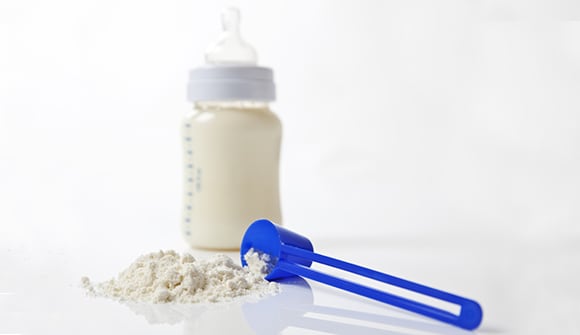Can’t find formula?
Alternatives for feeding your baby.
Article Date:

You have enough stress as a new parent, and worrying about finding formula for your little one is an added hassle you just don’t need. Fortunately, the sparse shelves due to the national formula supply shortage are temporary. Your baby will survive – and you will too!
“In the long run, babies are going to be fine. The government is getting involved so there will be more products available soon,” said Randolph “Randy” Thornton, MD, a pediatrician with Jacksonville Pediatrics and Wolfson Children’s Hospital. “It may be tough for another month or two, but we will get through this.”
Dr. Thornton shared what parents should and shouldn’t do during the national baby formula shortage:
Don’t dilute. Adding water or cow’s milk to formula can be risky. “Parents are trying to stretch out their supply, but water dilutes out the nutrition babies need,” Dr. Thornton said. “It can be dangerous to substitute with cow’s milk too early because it can lead to anemia and bleeding in the gut.”
Don’t go homegrown. You may think combining a few healthy ingredients at home for your baby’s nutrition will suffice, but that’s not the case. Whipping up your own formula with condensed milk is not an option because it doesn’t have the nutrients babies require, nor is starting your baby on solid foods too early. It’s important to stick with formula if that’s what your baby’s used to, Dr. Thornton said.
Don’t believe the screen. Your co-worker’s neighbor may share ideas on social media for formula substitutes, but it’s important to consider where the information is coming from. You should only listen to guidance from a trusted source, like your pediatrician, especially when it comes to feeding your baby.
Do switch brands. Making a temporary change can ensure your baby still gets necessary nutrients. “If your child is on Similac® and you can’t find it, look for a comparable competitor’s formula like Enfamil®, Gerber Good Start® or a store-brand generic,” Dr. Thornton said. “It’s not ideal to switch to something else because subtle differences in the protein can cause digestive issues, but it’s not dangerous for those who aren’t on restricted diets. Certain formulas are lactose-free, while some use soy protein. If you find it confusing, check with your pediatrician.”
Do breastfeed, if you’re able to. If you’re getting ready to have a baby, consider breastfeeding, Dr. Thornton said. “There’s nothing better. The baby gets natural immunity, it helps reduce the risk of breast and ovarian cancer for the mother, and it may help a new mom get to back to her natural weight faster,” he added. “If you’re using formula to supplement, try to increase your breastfeeding.”
Do let older babes leap ahead. Since babies can have cow’s milk after 12 months, if your baby is over 11 months, you can try it (whole or 2%) or protein drinks like PediaSure ®, BOOST®, or other similar products for a few days, Dr. Thornton recommended. If your baby is having a lot of diarrhea or is spitting up, stop serving the new liquid.
Do call your doc. Reach out to your pediatrician for advice and before trying any DIY recipes. If your baby needs a hypoallergic formula, your doctor is a good resource. “If you can’t find anti-reflux formula, we can help you create an alternative. I’d much rather talk to parents than have them give their baby something harmful,” Dr. Thornton said. “And ask your pediatrician about formula – they often have samples they can give you.”
When a health crisis affects your child, you need a pediatrician you can trust. For help finding a pediatrician for your child, request an appointment online.



